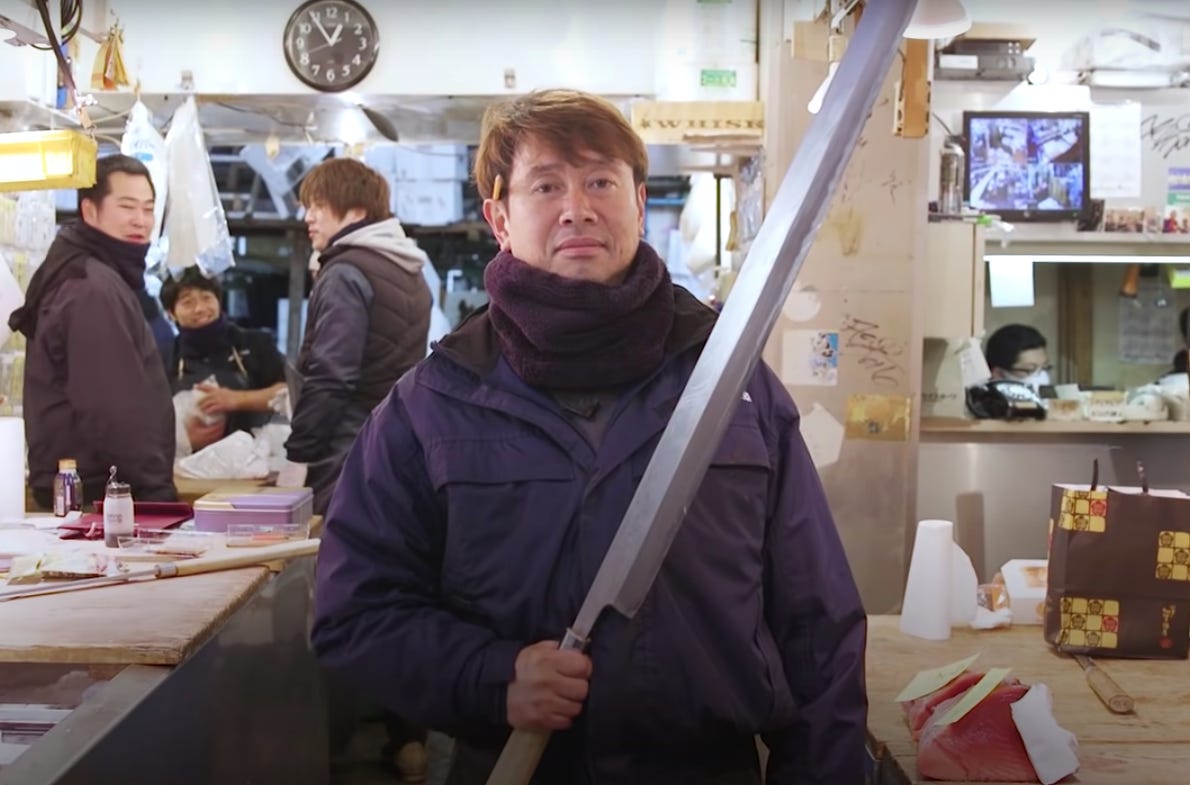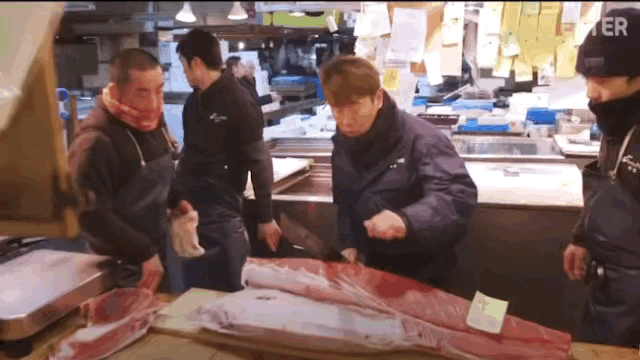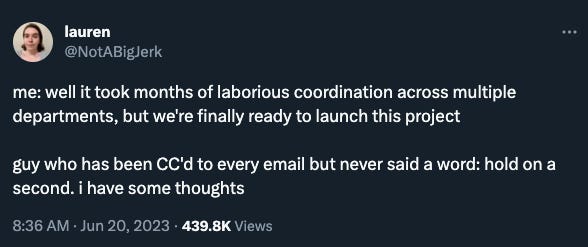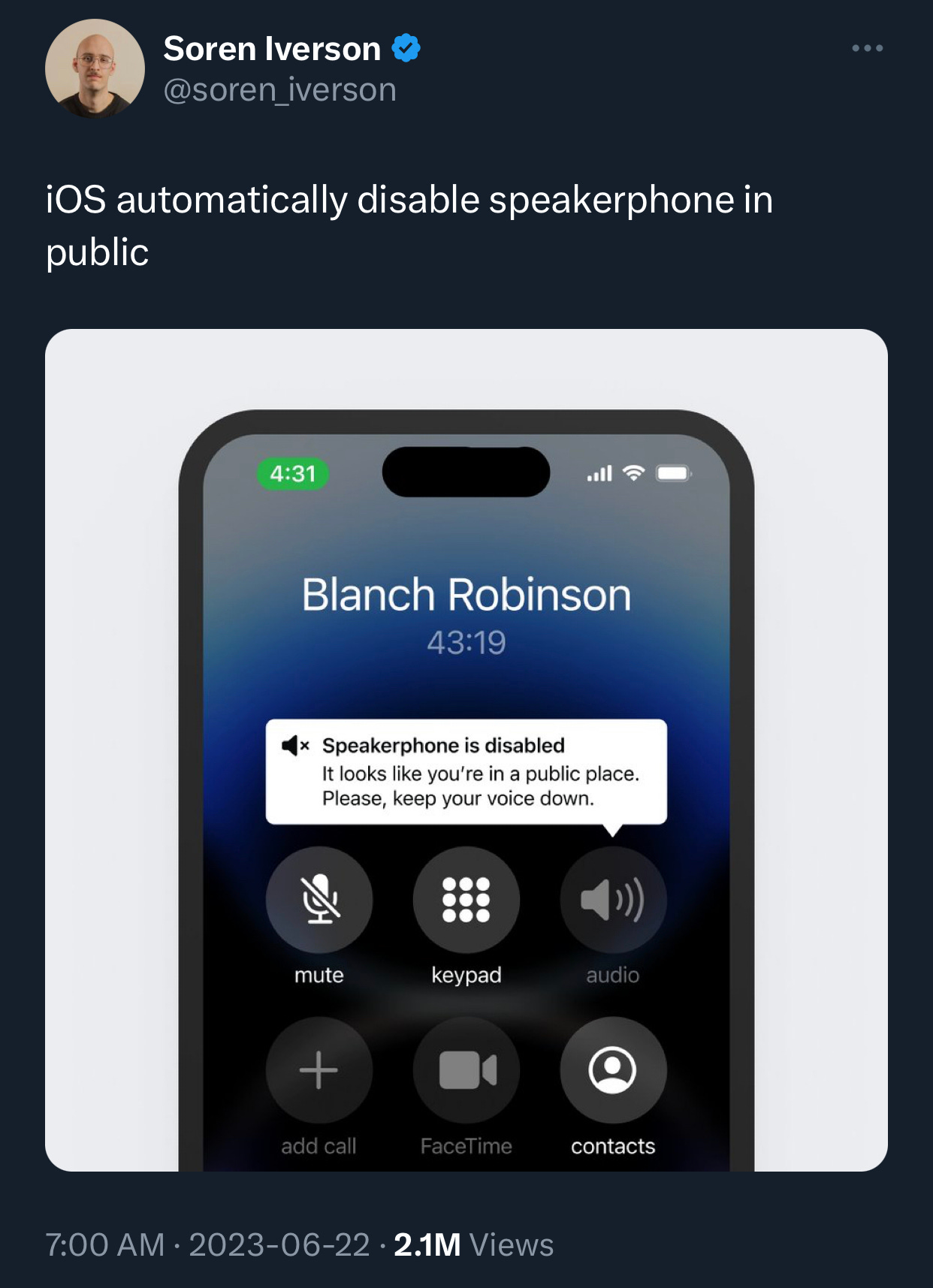Becoming the Tuna King
What are the table stakes for a profession? Do you want to pay it?
Thanks for subscribing to SatPost.
Today, we are talking about Japan’s “Tuna King” and what it takes to be successful in a chosen profession.
Also this week:
Michael Jordan’s $3B score
Spotify vs. Prince Harry and Meghan
And them fire tweets (including one on the iPhone box)
Last week, I was deep down the YouTube rabbit hole and stumbled upon a video about “The Tuna King”. His name is Yukitaka Yamaguchi, and he is one of Japan’s most famous fishmongers.
For decades, Yamaguchi held court at the iconic Tsukiji Market in Tokyo, which was the world’s largest wholesale seafood market before the fishmonger-ing area was closed in October 2018.
I was actually there a week before it shut down and — for one glorious afternoon — was “The King of Shovelling BBQ Unagi Sticks Down My Face”. Here is the evidence:
When someone is dubbed the “King” or “Queen” of something, it is safe to assume that they are very proficient in their profession. But how do they actually become so good?
Athletics is an easy “profession” to visualize skill attainment. Everyone reading this article has played some sport and can grok the work required: tennis (smash 10,000 serves), basketball (make 200 jump shots a day), football (memorize 40 running and throwing plays), soccer (do hours of dribbling drills), long-distance running (knock out 50km a week) and etc.
In addition to the training, reaching the peak of any sport requires incredible fitness, decades-long dedication and genetic luck.
In other words, the table stakes for athletics is well known.
When I watched the 12-minute Eater YouTube video about Yamaguchi, I was trying to understand the table stakes for the Japanese fishmonger trade.1
Is this something I would want to do?
To answer that, let’s dig into Yamaguchi’s background. With the help of his father, he entered the fishmonger business in the early-1980s as a young twenty-something. Today, he sells tens of millions of dollars of fish a year and heads an operation that includes seafood wholesaling and retailing, as well as a restaurant business.
What does the peak of Japanese fishmonger-ing look like?
3 hours of sleep a day: Anyone who has been to Tsukiji Market knows that the main event — a fish auction that regularly sells a single tuna for over $100k — takes place around 5am. This means that buyers and sellers are preparing in the earliest hours of the morning. Yamaguchi says four hours of sleep is a “good night”. He usually gets three. Not only is he up early, but he also stays up late because he works…
…with the food & beverage industry: Yamaguchi sells fish to ~1000 restaurants in Japan and around the world (including many Michelin-starred locations). To serve this client base, “The Tuna King” has memorized all the menus and knows which tuna matches each restaurant, down to the type of rice they use.
Encyclopedic tuna knowledge: Yamaguchi can identify the origin of a tuna based on a single bite, as the flavour of the fish is determined by what it eats. Like a wine connoisseur, Yamaguchi’s palate is able to detect whether the tuna is from the Atlantic (tasting like herring) or Japan (tasting like seaweed, mackerel, plankton, squid). To gain this expertise, he has eaten a bowl of tuna and rice twice a day for nearly four decades.
A giant sword: Yamaguchi wields a samurai-looking sword to carve the fish. I don’t know if sword size is correlated to performance, but it objectively looks cool (he even uses it to slice off fresh wasabi).
In a separate interview with travel blog Luxeat, Yamaguchi broke down his daily routine: “I wake up at 2:30am, arrive at the market around 3:20am, start the auction at 5:30am, work at the market until 2pm or 3pm, have meetings from 5pm to 6pm and dinner meetings from 6pm onwards.”
Anyone who wants to compete with “The Tuna King” must be willing to work those weird hours, memorize constantly changing menus and essentially eat the same thing for every meal.
These are the table stakes at Yamaguchi’s level.
Without a doubt, Yamaguchi is an extreme example. But every profession has someone as dedicated or as obsessed as “The Tuna King” is with fish-mongering. The key for any pursuit you deem worthwhile is to understand what the table stakes are and if you are willing to pay to reach that level.
Maybe you want to be a fishmonger but one that is content with more work-life balance. Instead of being “The Tuna King”, you are cool being “The Tuna Court Jester”. You could probably pull it off by sleeping 6 hours a night (instead of 3), memorizing 100 menus (instead of 1000) and eating tuna twice a week (instead of twice a day).
Based on that, the fishmonger life is clearly not for me. However, I do have an interest in writing and here are the table stakes for the best in that trade:
Danielle Steele: With 800 million books sold, Steele is the best-selling living author. In 50 years of work, she has published 190 books. She gets to her desk at 8:30am every day and writes for high teen hours (Steele is also a light sleeper).
Michael Crichton: One of the biggest cultural influences in the 1990s, Crichton scored the trifecta of having the #1 book, film and TV show in the same year. He did it in 1995 with ER (TV), Congo (Film), and The Lost World (book). Oh, and again in 1996 with ER (TV), Twister (Film) and Airframe (book). Crichton passed away in 2008 but his work remains popular and he has sold over 200 million books. While studying at Harvard Medical School, Crichton would frequently write 10,000 words a day and published multiple novels under a pseudonym before graduating (he never practiced medicine). Steven Spielberg — who adapted Crichton’s book Jurassic Park to film — said that Crichton was known for working 18-hour days for weeks on end until a project was completed.
Taylor Sheridan: The Yellowstone creator — who also wrote the films Sicario and Hell or High Water — built a “one-room writing cabinet” in Wyoming and will knock out one show episode during an 8-10 hour solo writing session.
Stephen King: The Horror King has published over 50 books and sold 350 million copies. In a 2016 interview with George R.R. Martin, King explained that he writes 6 pages a day every day until a first draft is done. “If you want to be a writer,” King says in his book On Writing, “you must do two things above all others: read a lot and write a lot. There's no way around these two things that I'm aware of, no shortcut.”
Across these authors, the table stakes are a large volume of daily writing.
Clearly, there are costs to this type of lifestyle: Steele and Crichton both had multiple divorces while King has dealt with serious substance abuse issues (King is such a prolific writer that he doesn’t even remember writing the best-selling book Cujo, because it happened during an alcohol-induced blackout phase of his life).
Although I definitely do not want to write 18 hours a day, I am happy to pay the table stakes of writing every single day and committing to a set publishing cadence. I have done it for many years and plan on doing so — in some form — for the rest of my life.
I suspect there won’t be many other “jobs” that I feel this way about. And since any single person is limited to how many professions they can truly pursue, understanding the table stakes ends up being a great filter for knowing what not to do.
Here is a recent example for me: as my audience grew over the past few years, I had many offers to work for (or launch) a venture fund. I considered it and wrote some angel checks. If I am being honest, though, the appeal of venture capital was largely mimetic. I didn’t actually care about investing but saw many people I know doing it so thought “eh, might as well try.” After a while, I realized that the table stakes for basic VC-ing didn’t appeal to me. Stuff like managing LPs, sourcing deals, reviewing decks, networking on Zoom and checking in on startups (there is a shocking little amount of BBQ unagi it seems).
In terms of the “The Tuna King” example, I wanted to wield a giant samurai sword without doing the work of memorizing 1000 different menus or eating tuna for lunch and dinner everyday. So I dropped the idea.
If we are talking about choosing professions, there is one cliché that needs to be addressed: “follow your passion”. I’m in the camp that thinks this is bad advice. Why? Because it is incomplete. Saying that you are passionate about something does not mean much if you are not willing to pay the table stakes. It also does not mean much if your skillset or temperament does not align with what the table stakes require.
Or as Yamaguchi puts it: “If you love it, you’ll teach yourself. If you don’t love it, others will teach you.”
Today’s SatPost is brought to you by Bearly.AI
Why are you seeing this ad?
Because I co-founded an AI-powered research app called Bearly AI. And I really like putting blue buttons in this email. If you press this blue button below, you can try AI-powered tools for reading (instant summaries), writing (ChatGPT) and text-to-image art (literally type some text and get a wild image).
It’s all available in one keyboard shortcut (and an iPhone app).
Links and memes
Michael Jordan’s $3B score: Speaking of the best, Chicago Bulls legend Michael Jordan recently sold his majority stake in the Charlotte Hornets NBA franchise at a valuation of $3B. He will retain a minority position but sold the rest to a group that includes Gabe Plotkin, the hedge fund manager who was shorting GameStop during the Wall Street Bets drama in 2021. The transaction is more than a 10x return on his initial investment from 13 years ago. While the Hornets performed poorly on the court during Jordan’s ownership tenure, the sale is a huge coup financially per Huddle Up’s Joe Pompliano:
[BET founder Robert Johnson] initially wanted between $325 million and $350 million for the [Charlotte franchise]. But with several million dollars in upcoming interest payments on the team’s $40 million in bank debt, Johnson sold the team to Michal Jordan at a reported $275 million valuation in 2010.
But that’s only half the story — because Michael Jordan really only put down $25 million in cash on an equity valuation of $170 million, and the remaining $105 million of enterprise value was mostly comprised of existing debt on the team's business.
So, in simple terms, Jordan paid just $25 million out of pocket to buy the team.
A popular metric in private equity investing is the internal rate of return (IRR). Jordan’s 13-year investment — which probably netted him $1.5-2B (more than Nike has paid him throughout his career) — generated an IRR of 20%, which is second all-time among NBA team sales to Russian billionaire Mikhail Prokhorov, who generated an IRR of 27% “from his nine-year stewardship of the New Jersey/Brooklyn Nets” per Axios.
Spotify’s podcast shake-up. Meghan Markle and Prince Harry ended their podcasting relationship with Spotify last week. They cut a $20m deal with the streaming giant but only produced 12 podcast episodes and made zero impact. Bill Simmons — founder of The Ringer and Spotify’s head of podcast innovation — called Meghan and Harry “f—king grifters” for how little effort they gave despite the big payday.
Spotify has made waves spending 9-figures on podcast-native talent (like Simmons and Joe Rogan) but they have also thrown a ton of money at big names just because they were big names. However, podcasting is a medium that takes a long time to acquire listeners and build an audience. Big names don’t guarantee success. Another example: a Spotify podcast with Barack Obama and Bruce Springsteen failed to take off.
It is understandable why Spotify is making a podcast push. Unlike music streaming — which pays out 70%+ of revenue to record labels and artists in the form of royalties — podcasts are something that Spotify can own, and thus improve their margins in the long-term (for more: check out Hot Pod’s article on Spotify’s changing podcast strategy and recent woes).
Anyways, here is a stat to frame the Harry and Meghan miss: The Weeknd’s “Blinding Lights” is the most streamed song on Spotify ever. Assuming the payout is $0.005 a stream — which is on the high end — that song has paid out less ($18.2m) than the deal Harry and Meghan got paid to only make 12 podcast episodes ($20m).
***
Some other baller links:
Apple Vision Pro: Last week, I wrote about why I want to buy Apple’s spatial computing headset. This week, I watched the Apple developer videos and found great clips on how the “eye sight and hand gestures” work as computer interaction inputs.
Classical music is often cited as a study aid but one Harvard researcher says there are different songs most effective for different focus modes. (CNBC)
Why did Twitch competitor Kick pay $100m to poach a single streamer? Live-stream monetization has been tricky but Kick is owned by a gambling website and can monetize by pushing viewers to the gaming products. (The Split)
…and here are some fire tweets.
Last thing: Elon and Zuck may be headed for the biggest pay-per-view event ever. Meta is about to launch a Twitter competitor called “Threads”. Elon has been taking jabs at the product and pitched an idea of a “cage match” between him and Zuck. Zuck responded on Instagram with this screenshot saying “send me location”:
UFC founder Dana White has spoken to both tech CEOs and said they are “dead serious” about the match, which Elon wants in a “Vegas Octagon” (I’m guessing it doesn’t happen but the PPV could easily make $100m+ and it would go to charity). Zuck has been training like crazy with jujitsu but Elon is 6 inches taller and weighs 50lbs more (I’d bet on the size advantage). Anyways, here is a tweet comparing the two that received a reply of “accurate” from Elon:
Two relevant notes: 1) I know that bluefin tuna stocks are being depleted from overfishing (countries have agreed on global quotas but it is not clear that the quotas are working); and 2) another Japanese fishmonger named Kiyoshi Kimura also lays claim to the title of “Tuna King” (but I haven’t watched a video about him).












Love your work, Trung! Became a fan after watching your talk with Paul Millerd.
About the tuna king - wild. I love that documentary.
.. but 'get home after midnight, get up at 2:30am'... seriously?! 😅
Keep up the good fight 👊
Amazing recap! Insane to see the work ethic of those writers